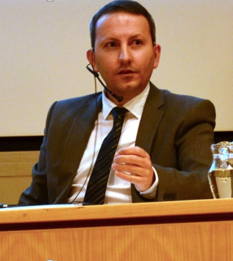
Physicians’ involvement in human rights
As physicians we’re often confronted with different issues of ethics and human rights at different levels. Physicians can on the one hand be involved in the treatment of injuries related to war, but also in different forms of human rights violations.
Salvador Allende and Che Guevara were physicians seen as heroes and social reformers by many, even outside of their respective countries: Time magazine claimed Guevara to be one of most influential personalities of the 20th century. On the other hand there have been physicians like Mengele or Illig working actively and by their own free decision without regard for medical ethics in the German and Austrian National Socialist regime performing dubious “research” in the spirit of that ideology.
Physicians can also be convinced to violate ethical standards in a situation of “dual obligations”, common in situations such as prisons. Dr. Wendy Orr, a former District Surgeon in Port Elizabeth in South Africa, wrote in her foreword to the British Medical Association’s handbook on medicine and human rights, about her work with detainees during the apartheid regime. She describes how she became aware of the systematic abuse of detainees by the security forces and the silence and complicity of her medical colleagues. She recounts her growing moral disorientation as she realized she was expected to declare patients “fit” for corporal punishment.
Similar situations have recently been reported in asylum cases even in countries with better earlier human rights track records. US physicians and psychologists have further been involved in planning and observation of torturing prisoners in Guantanamo.
Upholding human rights
Human rights systems such as the universal prohibition of torture, outlined in UN Convention against Torture are so fundamental that they cannot be suspended under any circumstances, they are “non-derogable”, and their violation can and must be investigated and prosecuted. Physicians should have a special positive role in this process.
The “Istanbul Protocol” supported equally by the UN, and the World Medical Association, is an interdisciplinary standard that guides physicians and legal professionals to collaborate in ethical and humanitarian standards, forensic documentation, reporting, and investigation of alleged torture. It can also contribute to new strategies in the protection of survivors applying for asylum and for prosecution of perpetrators.
Physicians can put themselves at risk for upholding these legal and ethical standards. For instance, it’s been reported that those who have witnessed torture in Kahrizak prison in Iran have been killed.

An Iranian physician, Ahmadreza Jalali, has been sentenced to death in Iran because of allegations of spying for other countries. Up to now none of international protests and activities for his unconditional release have proven to lead to any significant positive development.
All over the world health professionals put themselves in danger by being involved in activities to maintain human rights through organizations such as Physician for Human Rights, Physicians without Borders, the International Rehabilitation Council for Torture Survivors. Without involvement of these organizations many areas of the world crisis regions would have no access to medical care.
The basic background of these activities are international standards and treaties along with ethical guidelines of the medical profession. The 1948 Universal Declaration of Human Rights already mentions health as part of the right to an adequate standard of living (art. 25). The right to health was again recognized as a human right in the 1966 International Covenant on Economic, Social and Cultural Rights. There are international instances of shortage of access to medical services, because of military conflicts or secondary to sanctions against a country.
New challenges to ethics
Recently, the practice of medicine has been subject to several transformations with unprecedented ethical challenges. One is the exponential increase in the sophistication and reach of medical technology. From genetic manipulation to in-vitro fertilization, data and confidentiality protection to the ethical risks enclosed at times in the enormous advances in life-saving research and treatment, medicine has given rise to moral challenges of huge social significance that medicine itself, and the Hippocratic tradition, have on their own not sufficiently responded to. Instead medicine has formed a fertile relationship with other disciplines, such as moral philosophy and medical law, to seek philosophically coherent and socially and legally acceptable responses to these questions.
Given that the most serious threats to medical impartiality have come largely from interference by governmental agencies, but also by excessively powerful commercial companies or political groups, a critical aspect of medical impartiality is the doctors’ ability to speak out about health-related aspects of conflicts.
Where, for example, doctors are seeing patients who have sustained injuries as a result of state responses to civil unrest, the documentation and reporting of those injuries is a core part of the medical response. If doctors cannot speak out, if they cannot draw attention to the health-related impacts of conflicts, they risk the loss of their professional independence.
If they voluntarily violate fundamental standards, they should not be permitted to practice and medical associations and governments should take care to take all necessary steps to ensure this principle, while on the other hand supporting human rights defenders.
Friedrich Schiller, also a physician, was against any restriction of personal or political freedom and emphasizes in the following poem in a way that could be extrapolated to the duties of physicians that we should focus our work on the needs of our patients:
Live with your century;
but do not be its creature.
Work for your contemporaries;
but create what they need,
not what they praise
Comments